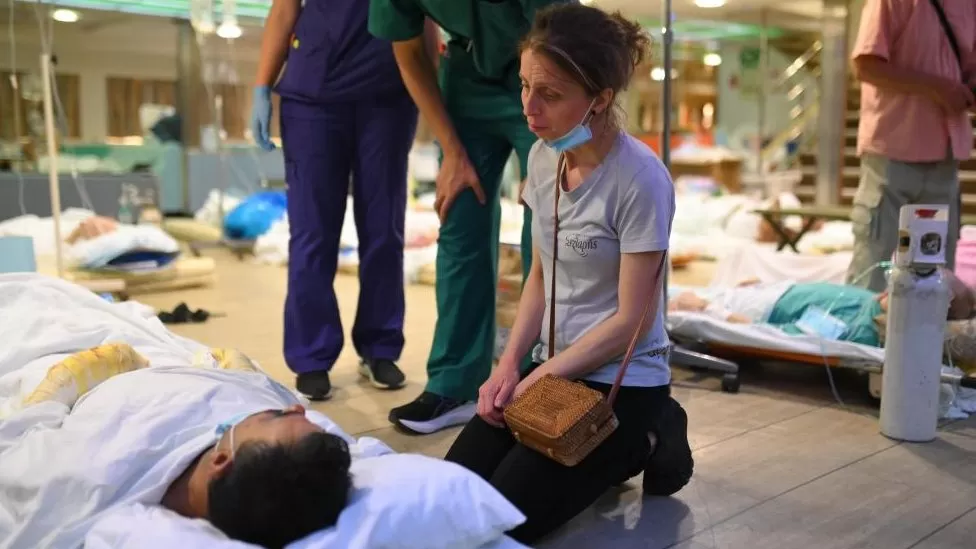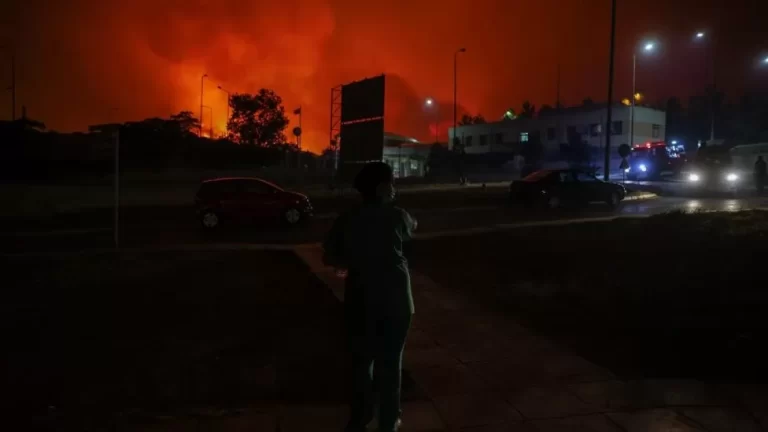Dozens of patients have been moved out of a hospital in north-eastern Greece as wildfires burn out of control for a fourth day near the city of Alexandroupolis.
The flames approached the grounds of the university hospital and many of those evacuated were taken to a ferry in the nearby port. Among those moved were new-born babies and intensive care patients.
Explosions in the hospital area were blamed on oxygen bottles exploding. Alexandroupolis, a major port close to Greece's north-eastern border with Turkey, is one of a number of Greek regions tackling wildfires, whipped up by high winds and temperatures which are set to reach 39C (102F) on Tuesday.
Fires are raging elsewhere – on the island of Evia and in Boeotia in central Greece, where several villages have been evacuated.
At least one person has already died because of the fires ravaging villages close to Alexandroupolis. Greek officials ordered a fleet of ambulances and buses to take some 115 patients away from the university hospital on the north-east fringe of the city.
Reports said the flames entered the grounds of the hospital while the operation was taking place and the hospital was enveloped in a thick cloud of smoke and ash.
A fiery, red glow was visible throughout the night on the fringe of Alexandroupolis and satellite images showed several regions of Greece covered in thick smoke. While some of the patients were moved to other hospitals in the city, as many as 90 were taken to a ferry, the Adamantios Korais, which has been requisitioned to look after intensive care and new-born babies.
Patients hooked up to oxygen bottles lay on mattresses on decks of the ship converted into hospital wards, while tents were erected to greet some of them on the shore.
During the night residents in eight nearby villages were told to leave their homes and head for safety in Alexandroupolis. Fires have also been burning dozens of kilometres to the north-west of the city, in Rhodope and further west along the coast in Kavala.

France, Cyprus and Romania have sent reinforcements to help Greek firefighters. Summer wildfires are common in Greece but scientists have linked the increasing frequency and intensity of extreme weather events, including heatwaves, to climate change.
Last month, thousands of people were forced to flee fires on the Greek island of Rhodes after wildfires broke out there and in other parts of the country.
“Greece already had by far its worst July since 2008 in terms of wildfires,” the EU's Commissioner for Crisis Management, Janez Lenarčič, said on Monday.
“The burnt area is bigger and the fires are more intense and more violent, burning more area than before.”
A spokesperson for the Greek fire service, Ioannis Artophios, said they were faced with “extreme phenomena” and that everyone needed to “adapt to this difficult situation.” Greece is one of several European countries currently at extreme risk of wildfires, according to the EU's climate monitoring service, Copernicus.
Fire crews have been battling a blaze on the Spanish island of Tenerife for almost a week, but the authorities there believe the worst is now behind them.
The fire has burned through thousands of acres of land and forced the evacuation of more than 12,000 people, according to the regional government. Parts of southern France, meanwhile, could experience record-breaking heat in the coming days. Temperatures of more than 40C are expected in places including the Rhone valley.
— CutC by bbc.com


